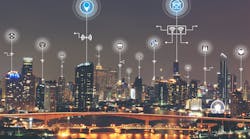Parks Associates' latest white paper entitled, Simplifying the IoT Edge: Smart Spaces Best Practices, addresses the demand, growth, and use cases of IoT edge platforms in smart buildings, including apartments and multi-dwelling units, retail and warehousing, and hospitality and building management sites.
The research, developed in partnership with Technicolor Connected Home, shows that over one third (34%) of US multi-dwelling unit (MDU) property managers report offering internet of things or smart home devices to residents in at least one property that they manage.
"The property management industry is in a unique position to take the integration of consumers' physical and digital lives to the next level," points out Girish Naganathan, CTO for Technicolor Connected Home. "Apartments, condos and other MDUs that offer IoT-based services are creating new value propositions that will transform the entire sector. By redefining how people interact with their most intimate environments, property managers will also influence how IoT-enabled experiences are extended to other critical settings -- including workplaces and public spaces."
For the new research, Parks Associates' consumer surveys found that that internet access is a top amenity for MDU residents, while smart home device offerings are emerging as a key differentiator for properties.
Naganathan added, "As a leading provider of connected devices and software for the home, Technicolor Connected Home deeply understands the opportunity presented by the promise of IoT. We are working closely with property management companies and cloud platform providers to develop, deploy and integrate next-generation technologies into the living spaces of consumers in a safe, secure and sustainable manner."
Parks' white paper also notes that almost two-thirds of prospective MDU residents report that pre-installation of smart home devices is an important factor when selecting a new apartment.
"Parks Associates defines 'smart spaces' as physical locations, equipped with networked devices and sensor-based solutions, that give individuals data about the location's parameters and how the space is being used," noted Kristen Hanich, research director, Connectivity, Parks Associates. "Smart spaces have a strong overlap with smart home, industrial IoT, and Industry 4.0, making use of the same concept of networked sensors feeding into larger data platforms."
The researcher further noted that smart apartments feature smart amenities for residents, as well as technology solutions for community management and building automation; and that the growing smart apartment space presents a unique area for IoT technology deployments, with specific benefits and challenges.
Parks' Hanich concluded, "Technology investments are costly and need to last for many years. However, the pace of technological innovation is constantly increasing, and innovations happen frequently. For companies to gain the full benefit of investment into smart spaces technologies, as well as the advantage of being able to deploy new and innovative technological solutions, IoT deployments must be as future-proof as possible."


